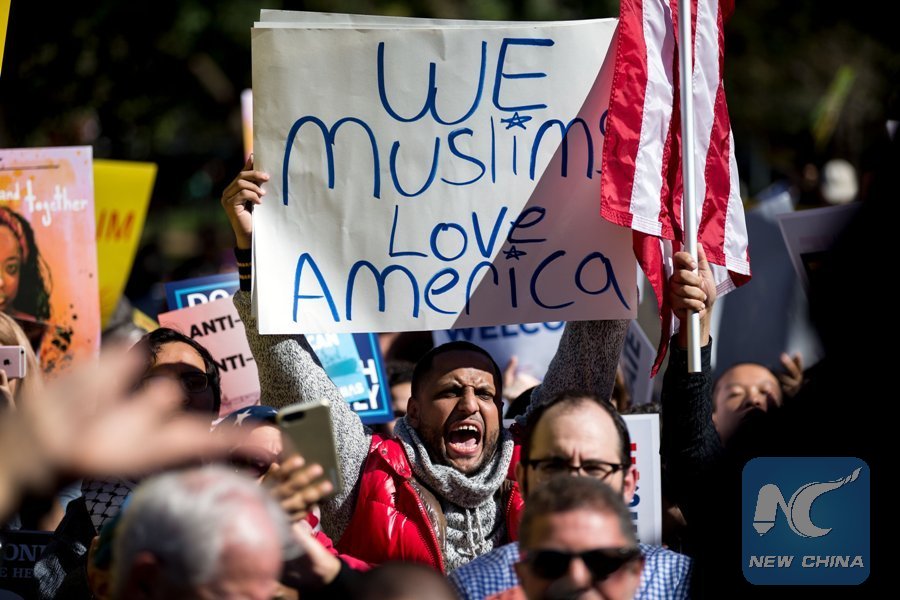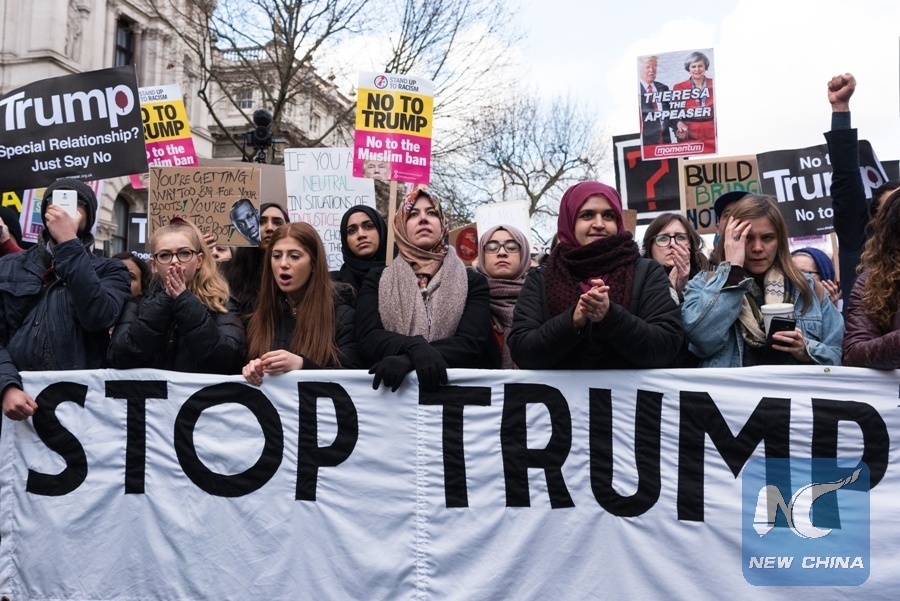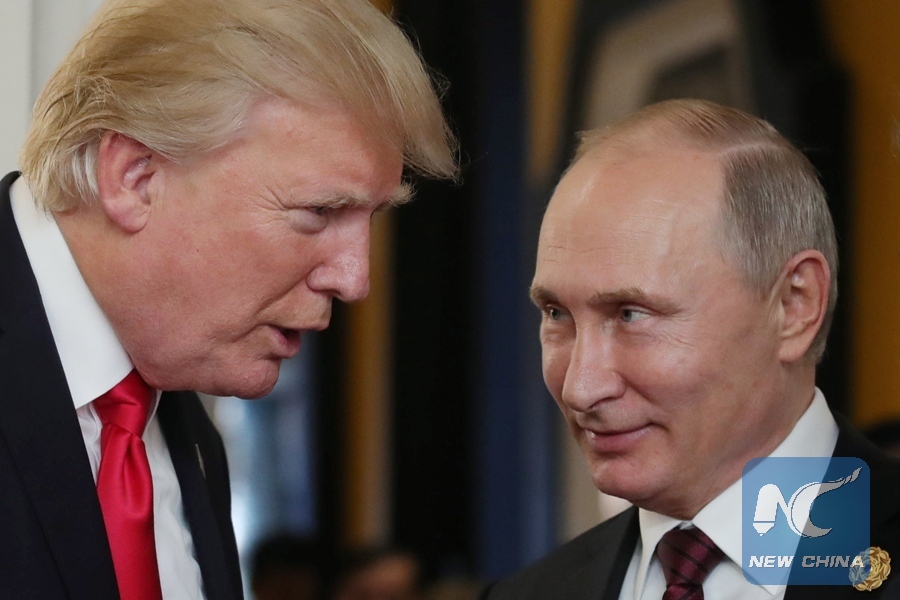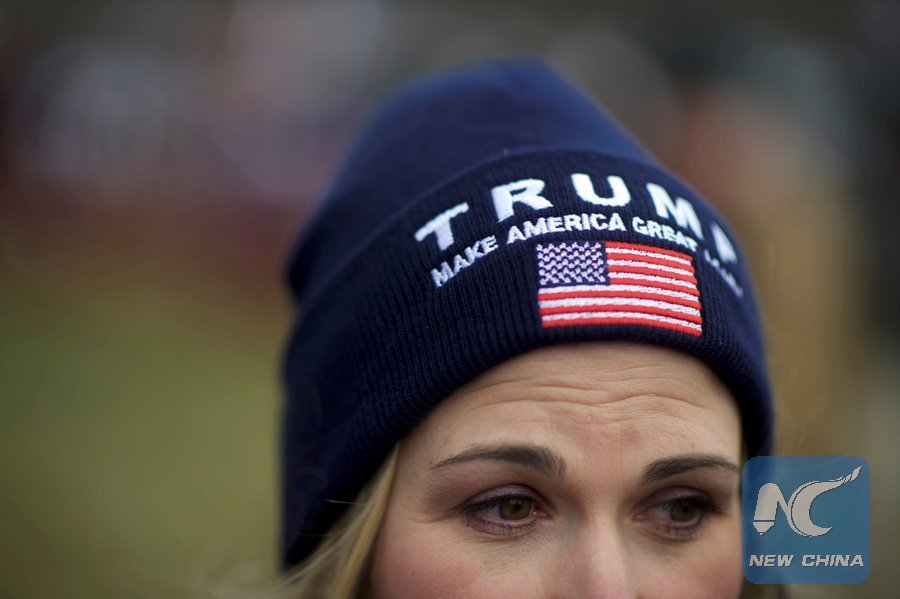
People protest against the new travel restrictions near the White House in Washington D.C., the United States, on Oct. 18, 2017. (Xinhua/Ting Shen)
WASHINGTON, Jan. 21 (Xinhua) -- Following a year defined by political polarization, feuds, and controversies, U.S. President Donald Trump was forced to embrace his second year in office with a government shutdown.
Besides the relatively short-term obstacle in sight, the Trump administration is likely to face enduring challenges in several domestic fronts.
IMMIGRATION OVERHAUL
Following the momentum to pass the biggest tax cuts in 30 years at the end of last year, the Trump administration intended to push for an immigration overhaul this year, as one of the pillars holding up the president's second year in office.
Nevertheless, the efforts started with worldwide outrage after Trump reportedly used racial slurs to describe immigrants from Haiti and African countries in talks with bipartisan lawmakers at the White House over an immigration deal earlier this month.
Trump denied being a "racist" ,facing condemnation for what many people described as his racist views, marking an unpleasant episode that would cast a shadow over the Republican's upcoming efforts to reform the immigration system.
The president's hard-line stance against immigration is no stranger to controversy. Last year, he introduced several travel bans and terminated multiple programs that protected illegal immigrants from deportation, leading to waves of criticism and protests at home and abroad.

Thousands of demonstrators protest against Donald Trump travel ban on Muslim's travelling to the United States in central London on Feb. 4, 2017. (Xinhua/Ray Tang)
This year, the White House suggested that the president and bipartisan lawmakers had reached an agreement to negotiate legislation that would prioritize reforms in border security, chain migration, the visa lottery and the Deferred Action for Childhood Arrivals (DACA) policy that prevents deportation of young immigrants known as "Dreamers" brought to the country as children.
However, the disagreement between Republicans and Democrats over the handling of the DACA program led to failure to pass stopgap spending bill Friday, forcing the federal government to shut down for the first time since 2013.
As fierce partisan fights intensify, it remains unclear whether Trump would be able to get anywhere close to his proposed border wall or merit-based immigration system.
RUSSIA PROBE
Third year into the Russia probe, special counsel Robert Mueller and several Congressional panels continue their investigations into alleged Russian meddling in the 2016 U.S. presidential election and possible collusion between the Trump campaign and Moscow.

File photo taken on Nov. 11, 2017 shows U.S. President Donald Trump (L) speaking with Russian President Vladimir Putin as they attend the APEC Economic Leaders' Meeting in Danang, Vitenam. (Xinhua/AFP)
Analysts said it is still no end in sight as political feud is intensifying, bound to distract Trump from his priorities and undermine his presidential achievements, but unless a smoking gun remains unrevealed, Trump is not really likely to get impeached.
Among those investigations, the Mueller-led one is considered the most likely to lead to somewhere. And Trump does not like it.
Since his appointment following Trump's firing of the former FBI director James Comey, Mueller has investigated four former members of the Trump's campaign team, two of whom pleaded guilty, and his team has dug in beyond the election period. Besides, Mueller was reportedly seeking to interview Trump.
The special counsel is mostly looking into three directions, whether the Trump team colluded with Moscow to interfere with the elections, whether the president obstructed justice by firing Comey, and the Trump families' financial dealings.
However, experts said that regardless of any breakthrough Mueller makes, there would be procedural and legal hurdles before he could initiate any charges against a sitting president. An impeachment would be a political fantasy as long as the GOP (nickname for the Republican Party) controls the Congress.
As the midterm elections is approaching, the Russian probe that falls subject to political fight is destined to be surrounded by feud and controversies.
MIDTERM ELECTIONS
Trump made his first foray into the 2018 midterm elections last week by visiting a congressional district in the state of Pennsylvania, an early sign of the stepped-up involvement which the White House has promised the Republicans.

A supporter of President Donald Trump wears a campaign hat during a "People 4 Trump" rally at Neshaminy State Park in Bensalem, Pennsylvania, U.S. March 4, 2017. (Xinhua/REUTERS)
The results of this year elections, slated to be held in November, would be enormously important, as pundits said. Not only would they affect Trump's presidency but also reshape the political landscape for the coming years.
Democrats are galvanized after a series of wins, including flipping an Alabama Senate seat to their own with Doug Jones' stunning victory against Trump-backed Republican candidate Roy Moore, igniting their hope to take over either or even both chambers of Congress.
Historically, midterm elections usually sees the party in power lose seats in Congress. On average, political parties of an incumbent president lost an average 30 House seats and 4 Senate seats in the past 21 midterm elections.
In the coming battles leading up to the midterm election, Democrats need only 24 seats to flip the House and two to take the Senate.
If Democrats flips either chamber, the party could obstruct any Republican legislative push, be more empowered to investigate the Trump team over the alleged collusion with Russia, and even initiate an impeachment, as well as blocking Trump's nominees to be confirmed.
Those are the risks that the White House cannot afford to ignore.
Conversely, if the GOP holds on to their control of both chambers of Congress in 2018, it may continue its long-promised efforts to repeal Obamacare - Trump's core campaign promise that failed to be delivered last year, push for more tax cuts, or other conservative agenda, all of which will be a non-starter if Republicans lose majority.

